Tokyo Metropolitan Government(TMG) has been proactively making efforts to promote sustainable finance through various actions in order to contribute to solving social issues through finance.Tokyo Sustainable Finance Week was organized by the TMG from Feb 8th 2021, with the aim to promote financial services that contribute to the establishment of a sustainable city and to develop Tokyo's presence in the field of sustainable finance.
‘Sustainable Finance Forum’, a high level forum for public and private sectors, including financial institutions and financial industry groups, was held during the Tokyo Sustainable Finance Week to discuss various possibilities offered by sustainable finance. At the forum, experts discussed the latest global trends in sustainable finance, the challenges in the sustainable finance market in Japan and a wide range of possibilities of sustainable finance that leverages the strengths unique to Tokyo. The program was divided into two sessions. In the first half, keynote speakers introduced current trends in sustainable finance. In the latter half, a panel discussion was organized. The panel experts discussed the diversification and possibilities of sustainable finance, including the perspectives of the post-COVID-19 era.
*Japanese-English simultaneous interpretation available.
| Time | Contents of the session | Speaker |
|---|---|---|
| 13:30~13:45 (15 mins) |
Opening Remarks/Speech The vision of “Global Financial City: Tokyo” and efforts regarding Sustainable Finance |
Hisaaki Terasaki Director General, Office for Strategic Policy and ICT Promotion, Tokyo Metropolitan Government |
| 13:45~14:15 (30 mins) |
Keynote speech 1 Global trends in Sustainable Finance |
Takejiro Sueyoshi Special Advisor, UNEP Finance Initiative |
| 14:15~14:45 (30 mins) |
Keynote speech 2 Development of Sustainable Finance in Japan |
Mariko Kawaguchi Specially Appointed Professor, Rikkyo University Graduate School of Social Design Studies Executive Advisor to CEO, Fuji Oil Holdings Inc |
| 14:45~15:15 (30 mins) |
Keynote speech 3 Sustainable Finance trends in Japan and overseas from the perspective of investors |
Yasunori Iwanaga Chief Responsible Investment Officer Amundi Japan Ltd. |
| 15:15-15:35 (20 mins) |
Coffee break | ― |
| 15:35-17:30 (115 mins) |
Panel discussion Discussion on diversification and possibilities of Sustainable Finance  
|
Panelists Leo van Stijn Managing Director, Country Manager Japan, ING Bank N.V., Tokyo Branch Satoshi Ikeda Chief Sustainable Finance Officer, Financial Services Agency Akie Iriyama Professor, Waseda University Graduate School of Business and Finance. Waseda Business School. Keisuke Takegahara Executive Officer, Deputy Chief Research Officer, Chief Manager of Sustainability Management Office, Corporate Planning & Coordination Department, Development Bank of Japan Inc. Takumi Matsuo Senior Officer, Corporate Strategy, Japan Exchange Group Tomoki Muto Managing Director, Global Head of Structured Finance, MUFG Bank, Ltd. Facilitator Yuki Isogai Technical Lead, Sustainability Center of Excellence, PwC Japan Partner, PricewaterhouseCoopers Sustainability LLC |

Takejiro Sueyoshi
Special Advisor, UNEP Finance Initiative
Graduated Tokyo University in 1967. Joined Mitsubishi Bank and worked until 1998. Appointed as a member of the Special UNEP FI Steering Committee during his years with Nikko Asset Management as Deputy President. Participates in various international conferences on "Finance and the Global Environment". Appointed as Chairperson of WWF Japan and Vice-Chair of Executive Board of Renewable Research Institute. Promote and guide "Principles for Responsible Investment" and "CSR (Corporate Social Responsibility)" to Japanese companies.

Mariko Kawaguchi
Specially Appointed Professor, Rikkyo University Graduate School of Social Design Studies
Executive Advisor to CEO, Fuji Oil Holdings Inc
Completed the master's program at Hitotsubashi University Graduate School (Environmental Economics) in 1986, and joined Daiwa Securities. Transferred o Daiwa Institute of Research in 1994 and experienced in company surveys. Currently working as a specially appointed professor at Rikkyo University, an assistant CEO at Fuji Oil Group Headquarters, and a special advisor at Daiwa Institute of Research Ltd. (since April 2020)

Yasunori Iwanaga
Chief Responsible Investment Officer, Amundi Japan Ltd.
Yasunori Iwanaga assumed the CRIO role in July 2020 to represent Amundi Japan on responsible investment and oversee its stewardship activities, having headed the investment group for six years from 2014. Before joining the firm, Yas was a managing director and CIO at BlackRock Japan, the former Barclays Global Investors Japan. He started his career in the asset management industry in 1997 at the Nippon Credit Bank. Yas earned his BA in law from Hitotsubashi University, MBA from the Wharton School, the University of Pennsylvania, and PhD in Finance from EDHEC Risk Institute. Yas is a planning committee member of the TCFD Consortium for FY2020.

Leo van Stijn
Managing Director, Country Manager Japan, ING Bank N.V., Tokyo Branch
Leo van Stijn was appointed as Country Manager Japan for ING Bank on October 15, 2018 .In this role he is responsible for ING Bank’s Wholesale Banking Business in Japan. Prior this new position, Leo was Global Head of Structured Finance Renewables, Utilities, and Power from December 2007 until August 2018. Leo first joined ING Bank as a management trainee in 1984, and has undertaken various client facing and managerial roles over the years, both within Retail and Wholesale Banking. After assignments as head of Credit Risk Management for the Netherlands and subsequently for the Americas region, he assumed the role of Global Head of Credit Risk Management for Wholesale Banking in 2004. Leo holds a BBA and MBA from Nyenrode Business University in the Netherlands.

Satoshi Ikeda
Chief Sustainable Finance Officer, Financial Services Agency
In March 2019, he was appointed as the first Chief Sustainable Finance Officer of the Financial Services Agency of Japan or JFSA. In this new capacity, he covers a wide range of issues concerning sustainable finance which include, among other things, leading the Sustainable Development Goals project team within JFSA, and promoting climate-related financial disclosure in line with TCFD recommendations in Japan.

Akie Iriyama
Professor, Waseda University Graduate School of Business and Finance. Waseda Business School.
Professor Iriyama joined WBS in 2013. Prior to joining WBS, he served as an assistant professor of State University of New York at Buffalo, United States, for five years. He received MA and BA in economics from Keio University, Japan, and Ph.D. from University of Pittsburgh, United States. Professor Iriyama has broad research interests in strategic management, international business, and entrepreneurship. He has widely published in premier academic journals including Strategic Management Journal, Journal of International Business Studies, Strategic Entrepreneurship Journal, Global Strategy Journal, and so on. Before pursuing his academic career, Professor Iriyama worked for Mitsubishi Research Institute Inc., a leading research/consulting company in Japan, as an industry economist/business consultant.

Keisuke Takegahara
Executive Officer, Deputy Chief Research Officer, Chief Manager of Sustainability Management Office, Corporate Planning & Coordination Department, Development Bank of Japan Inc.
Graduated from the Faculty of Law, Hitotsubashi University in 1989.Joined the Japan Development Bank (currently Development Bank of Japan, Ltd.) in the same year. Worked as Chief Representative in Frankfurt and General Manager of Environment and CSR Department. He has been in his current position and as Chief Manager of Sustainability Management Office since 2017.Engaged in planning in the field of environmental finance, such as the establishment of DBJ Environmentally Rated Loan Program for a long period. Currently, he oversees the bank's industrial research activities. Writing third-party opinions on corporate CSR reports and giving lectures on ESG and SDGs.

Takumi Matsuo
Senior Officer, Corporate Strategy, Japan Exchange Group
Takumi Matsuo joined his current position in 2016, and has concurrently been involved in a Sustainable Committee since its establishment in 2018. Prior to his current position, he has carried a wide range of functions and projects at JPX, including launching the ETF & Emissions Trading at listing, creating business planning of the JGB Futures & Options Market at Bonds Derivatives along with managing the equities field.
His working experience also includes Secondee positions at the Ministry of Finance of Japan and at JASDEC (Japan Securities Depository Center, Incorporated) during which he was involved in the setting up of the CCP for DVP Book-Entry Transfer of the Corporate Bonds. Takumi Matsuo holds an MBA of Tokyo University Graduate School of Law and Politics and the faculty of Law from Waseda University.
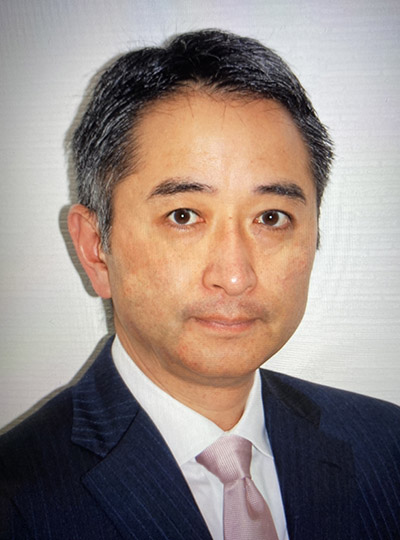
Tomoki Muto
Managing Director, Global Head of Structured Finance, MUFG Bank, Ltd.
Tomoki Muto is managing director and global head of structured finance, where he globally leads project finance, aviation & shipping finance and ECA trade finance. He has over 25 years’ experience in the banking industry joining the Bank of Tokyo (now MUFG Bank) in 1993, with comprehensive experience in project finance starting from 1997. He was seconded to the InterAmerican Development Bank in Washington DC from 2002 to 2005. From 2011 to 2015, he was posted in Sydney as managing director for project finance. After heading the project finance office in Tokyo from 2017 to 2019, he is now also in charge of a new function within structured finance through the sustainable finance office, which was established in August 2019.

Yuki Isogai
Technical Lead, Sustainability Center of Excellence, PwC Japan Partner, PricewaterhouseCoopers Sustainability LLC
Since 2003, Ms Isogai has been involved in private sector development as a specialist in public institutions such as World Bank before joining PwC in 2011. She is responsible for supporting clients in developing their sustainability vision and strategy, sustainability risk management systems, addressing social issues in developing countries and promoting sustainable financing. Tokyo University Bachelors degree in Literature. Tokyo University Masters degree in Humanities and Social Sciences.
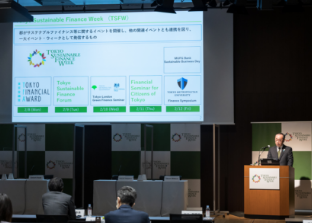
Director General, Office for Strategic Policy and ICT Promotion, Tokyo Metropolitan Government Hisaaki Terasaki
Global Trends in Sustainable Finance
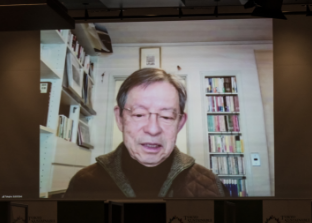
Special Advisor, UNEP Finance Initiative Takejiro Sueyoshi
History of the Development of Sustainable Investment in Japan-From SRI to ESG Investment-
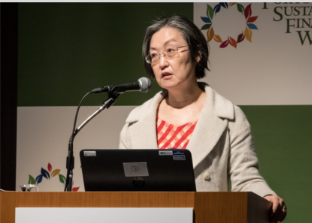
Specially Appointed Professor, Rikkyo University, Graduate School of Social Design for the 21st Century and Assistant to CEO of Fuji Oil Holdings, Inc. Mariko Kawaguchi
Sustainable Finance trends in Japan and overseas from the perspective of investors
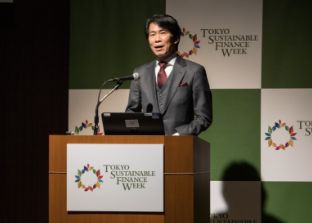
Chief Responsible Investment Officer, Amundi Japan Ltd. Yasunori Iwanaga
The panel discussion discussed “Diversification and Possibilities of Sustainable Finance" from financial administration, financial institutions, and academic perspectives: (1) Characteristics and trends of sustainable finance in Japan; (2) Corporate value and sustainable finance; (3) Non-financial/ESG information; and (4) The decarbonization era, With/After COVID-19, and beyond.
Opening
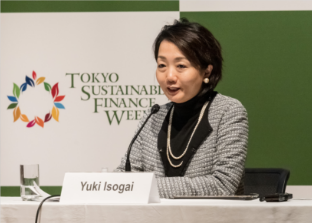
Theme 1 Characteristics and Trends of Sustainable Finance in Japan
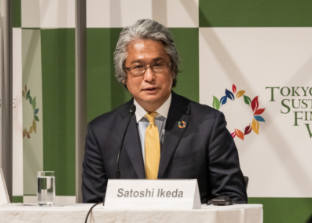
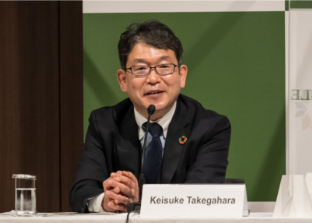
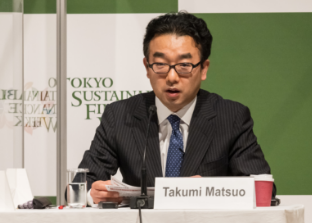
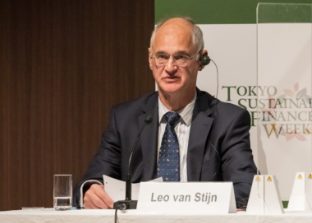
Theme 2 Corporate Value and Sustainable Finance
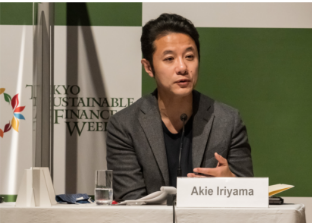
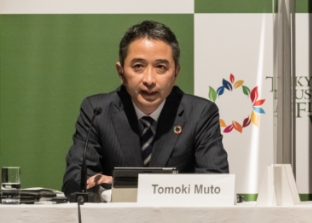
Theme 3 Non-financial and ESG Information
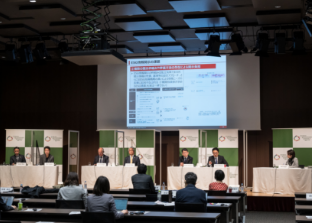
Themes 4 The decarbonization era, With/After COVID-19, and beyond
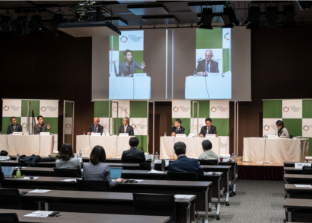
Closing
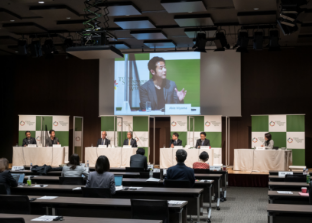
After the Q&A session, panelists gave their expectations for Tokyo aiming to become an advanced city in sustainable finance.